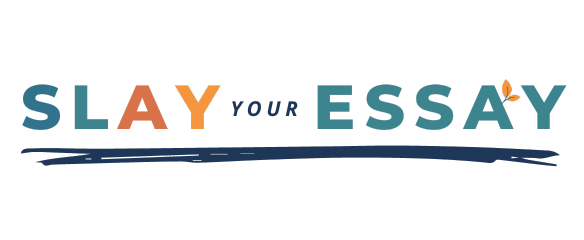The Truth about Your Personal Statement: Insights From a Director of Admission
You’ve heard countless teachers, school counselors, and internet articles tell you the same thing. Having a standout personal statement is a game-changer. But does one essay really matter that much? And what does a standout essay actually include?
Keep reading because your questions are about to be answered by an expert!
Slay Your Essay had the pleasure of remotely interviewing the Director of Admission and Recruitment at Lebanon Valley College, Hilary Yoh. Yoh has worked in the LVC admission office for 6 years now. And she’s read over 3500 personal statements for college applicants.
She admits, “There’s no sugarcoating that the college admission process is every emotion in the book – nerve wracking, challenging, exciting, daunting – you name it! “ But ultimately, she enjoys being able to support students through what she calls “most likely the biggest decision they’ve had to face in life (so far).”

Today we are sharing her biggest insights about the role of the personal statement in college admissions. We’ll also unveil how her college reviews application essays and provide some tips for writing your own standout personal statement.
How important is an applicant’s personal statement?
Yoh: The answer to this question may vary from college to college, but here is how Lebanon Valley College (LVC) views personal statements. As part of our application process, the only required materials needed from a student are the application and official high school transcript.
Additional materials including a personal statement, test scores (SAT or ACT), and letters of recommendation are optional to submit. If we receive these optional materials, we use them and they factor into the admission decision. If we do not receive them, there is no negative impact on the admission decision.
Even though a personal statement is optional, I ALWAYS encourage students to submit it – along with letters of recommendations – and here’s why: a high school transcript shows quantitative information – course names, grades, GPA, class rank, etc.
A personal statement lets me get to know the student beyond the numbers.
A student’s character, work ethic, and grit are often highlighted in their personal statement. Yes, I want to know that a student is prepared to be successful in the classroom, but I also want to know if they will be a good fit for our campus community.
Has the weight given to a student’s personal statement changed much in the last few years?
Yoh: I’d argue that the weight given to a student’s personal statement has increased.
Since the pandemic, we’ve seen a large number of personal statements and essays reflecting on how students struggled with virtual learning and persevered through mental health struggles.
On another note, more and more colleges and universities are making test scores optional to submit. With more students not submitted test scores, the weight given to a personal statement might be higher if they are submitting fewer materials.

What do the standout personal statements that you’ve read have in common?
Yoh: Some of the best personal statements I’ve reviewed have one thing in common…they’re different.
One recent essay was written from the student’s POV as she was about to jump out of an airplane to skydive. Her words and imagery were excellent. Long story short, she used her experience about skydiving to illustrate her passion to “live life to her fullest,” to be bold, and to have fun. It was awesome!
What do some of the least successful personal statements that you’ve read have in common?
Yoh: Misspelled words and easy grammatical errors add up. Not only does it look poorly on your writing skills, but also makes me question if you took the time to even read over what you wrote. How important is this statement to you if you didn’t take the time to proofread it?
Here’s a hint 🙂 We’re all accustomed to smart phones automatically capitalizing the “i.” When you’re typing in an application, it might not automatically correct it for you!
I’ve also read many statements that reference a college that isn’t ours (LVC). If you include the name of the college that you are applying to in the statement, make sure you change the name when you send it to a different college!
If you could give just one piece of advice to first-time college applicants preparing to write their personal statement, what would it be?
Yoh: There are universities out there that receive over 100,000 applications every year. After a certain point, these personal statements start to sound the same – stand out, be authentically you.
On behalf of all college admission counselors, please don’t start your statement with “You should accept me to your college because…”. It’s not original and it’s not exciting!
Don’t tell me “I’m very hard working,” show it. Tell a story that exemplifies it. Remember, you are one of 3,000 applications we’ll look at this year. How are you going to stand out from all the other students who are also very hard working?

In the larger picture of application materials, how does the personal statement rank?
Yoh: Given it is optional for students to submit a personal statement to LVC, the statement actually ranks towards the bottom when looking at an application.
HOWEVER, personal statements can be very impactful and are often used to solidify an admission decision.
Let me give you an example…
I just recently reviewed an application of a student that had earned all As and Bs their freshman and junior years. During their sophomore year, they earned two Cs and three Ds. Typically, when I see something like this I wonder “wait, what happened during their sophomore year?”
The student’s personal statement answered my question. The student used their statement as an opportunity to share that there was a house fire in the family home during the fall of sophomore year. Everything was lost and that explains the drop in academic performance.
If the student had not shared this information in her statement, a college may think she was slacking off and question her ability to be successful. Not only did I then understand the drop in academics, but I also learned a lot about the student.
She lost her house sophomore year and then was able to bounce back and earn top marks next year—that’s grit.
Personal statements can be used to showcase your strengths as a student and highlight your passions. They can also be used to tell a college anything that they should know that would be helpful when looking at your application.
How many different admissions counselors review a student’s personal statement?
Yoh: Each application that we receive will have a minimum of two reviewers. The first review is completed and a recommendation of admission or denial is made. The second review happens and that recommendation is either approved or changed.
LVC receives on average 3,000 applications annually – so that’s about 6,000 reviews that happen in total in our office. We pride ourselves on taking a holistic view of each application – paying individual attention to all materials submitted – transcripts, personal statement, letters of rec, additional application details.
How much time is spent reviewing one particular personal statement?
Yoh: An application review can take anywhere from 15 to 30 minutes.
What other advice do you have for college applicants?
Yoh: Be proactive! Don’t wait until the last minute to write or submit an essay or even your application! Ask questions – admission staff is there to help you – use them!
Disclaimer: Please understand that the information provided here is a reflection of just one admission director’s opinion based on her experience at her particular college. The purpose of this article is to demystify the college application process by sharing the perspective of someone on the “inside.” College applicants should still make sure they fully understand the admission requirements for the specific schools they are applying to.
If you’re looking for more support in writing a standout personal statement, learn about our self-paced course, Slay Your College Admission Essay.






